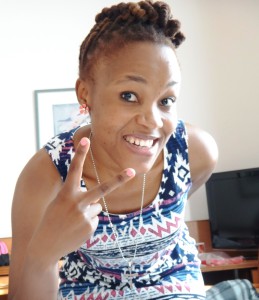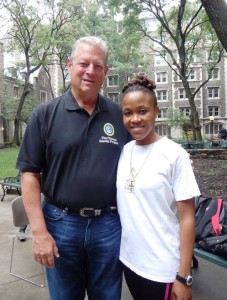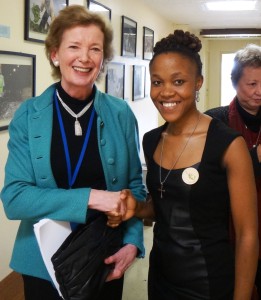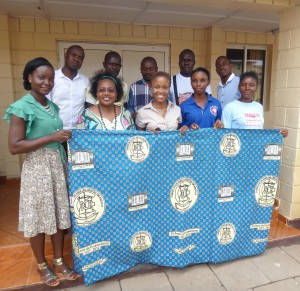SAFCEI's Lydia Mogano: climate injustice is her challenge!
- Published:
 Lydia Mogano is SAFCEI’s dynamic Regional Co-ordinator. Her hectic schedule keeps her on the move. It takes her to meetings with communities in the SADC region and to international faith and environmental conferences. Earth Keeper newsletter managed to pin her down for a telephone interview so that she could share some of her inspiring experiences with our readers.
Lydia Mogano is SAFCEI’s dynamic Regional Co-ordinator. Her hectic schedule keeps her on the move. It takes her to meetings with communities in the SADC region and to international faith and environmental conferences. Earth Keeper newsletter managed to pin her down for a telephone interview so that she could share some of her inspiring experiences with our readers.
Q: I believe that you joined the SAFCEI team in April of 2012! Why SAFCEI?
Lydia: Working at SAFCEI combines the best of both for me. My dreams as a young person who is passionate about the environment and is also a devout Christian are closely aligned with SAFCEI’s aims. Many work places acknowledge religious freedom. At SAFCEI, spirituality and environmental justice are enshrined in our day to day work.
Q: You are passionate about the environment! Do you have a special interest?
Lydia: Definitely climate justice and environmental advocacy! They are closely related. As a child growing up in a rural community, I spent most of my play time in nature exploring with my siblings. Our wild surroundings always brought us something new and I thrived on each discovery. My awareness about unequal access to resources started by chance when I was still a child. One day while playing far from home, my siblings and I followed a woman walking with a baby on her back and carrying a bucket. She was alone, which seemed unusual, so we followed her! She knelt down in a dry river bed and started digging away the sand with a metal bowl. We watched quietly, our imaginations racing. Only when she had dug down to a muddy layer did we realize that she was searching for water in the traditional way our elders had told us about! It was a desperately hot day. We had drunk our fill from the water tank at home, but by now we were parched. We watched thirstily from the shade. The woman waited for the mud to settle so that she could scoop up clear water to fill her bucket from the little pool she had made. For me the wonder of being able to dig for water was replaced by a deep sense of unease that some people still had to resort to such measures to get water. The woman lives in my mind, keeping my passion for environmental advocacy burning.
Q: We know what the solutions are! What is at the core of society’s inability to respond at the scale we need?
Lydia: In a phrase “the psychological games that people are playing in the interest of power and profit.” I am fascinated by environmental psychology and would very much like to further my studies in this direction. I don’t think our generation fully understands what massive industrialization and profit-driven development does to humanity’s consciousness and wellbeing. The moral and ethical aspects of impacts on vulnerable and affected communities are constantly being overlooked! We are constantly alienating ourselves from each other and from nature!
Sadly there is still a large dichotomy between science and society. Look at the history of the COPs (climate Conference of the Parties). At a psychological and spiritual level, they are very damaging. The process intends to make agreements that will result in change. In reality, there has been no meaningful consensus and very little commitment to address climate change! However, I believe hope was restored in New York at the climate march when the masses demonstrated their concern and commitment. Courage was inspired at Bonn in October. Now trust is needed for developing the new agreement in Lima! It is important to realize that COP does not replace the fact that all of us have a part to play to ensure the wellbeing of the planet and of generations to come!
Q: Your work title is Regional Co-ordinator. What does it entail?
 Al Gore meets Earth Keeper Lydia Mogano
Al Gore meets Earth Keeper Lydia Mogano
Lydia: My role is very flexible. Essentially my task is to introduce what SAFCEI stands for to faith communities in the SADC region and to grow our network and membership. SAFCEI works closely with the Southern African Council of Churches whose members have introduced me to their network. Through the Council of Churches I have had opportunities to meet people and promote the concept of multi-faith co-operation to care for creation and to act for environmental justice.
My role also involves representing SAFCEI at international conferences and discussion platforms. This is very exciting. It feeds my love for research and understanding the issues and my passion for advocacy. At times speaking in front of high profile people can be nerve racking. In June, I was invited by the Church of Sweden to participate in a debate with the Archbishop of Church of Sweden as well as their climate policy team on climate justice, multi-faith partnerships and the North South divide. I remember feeling awkward for a few minutes, and then I thought “OK God, you brought me here. Now is the time, help me speak!”
Having had the privilege of attending a number of high profile gatherings, I am very aware of how important it is not to perpetuate a message of gloom and doom. Instead we need to keep reminding people that collectively we can make a difference. It is also important to realize that we do not necessarily have to be “science experts” to share our experiences of climate change impacts or to participate in the environmental justice debate. The reality is, we are all affected although not equally! Part of promoting a positive message is to tell people about Ubuntu – not just about the connection between people that makes us who we are but also an Ubuntu with the web of life.
Q: At just 27 years young, a master’s degree in Environmental Psychology and Bio-cultural diversity and some amazing environmental advocacy opportunities, you have packed in a wealth of experience. Please share a highlight with us?
 Lydia with Mary Robinson
Lydia with Mary Robinson
Lydia: There have been many, but I had a great Aha moment at the Mail & Guardian celebration for 200 special young South Africans in Johannesburg. We were asked to identify what we considered to be key issues. Participants raised their hands and spoke about jobs, more growth – all anthropomorphic issues. None of them said anything about managing resource use or embracing the planet. It was alarming! Then the young woman next to me and I both put up our hands as the MC said, “only one more question”. “You take it,” she offered. I felt so humbled and connected, a sister to a stranger. I spoke about the problems we were creating for ourselves by putting humanity at the centre of the universe when we needed to understand that we are part of the web of life and dependent on the health of the planet as a whole. Around me people acknowledged what I said and suddenly the environment was on the agenda. It was raised as a key issue in the closing speech. That was a wonderfully inspiring and enlightening moment for all. Once again, I realized that context and how we get our message about creation care across is the key to getting it across!
Earth Keeper newsletter: Thank you Lydia! Your insights are inspiring. We look forward to further `Letters from the Regions’. Don’t give up on your dream to continue your studies in Environmental Psychology. The sooner we understand what connects us most deeply to creation the sooner we will be able to restore the connection and heal ourselves and our home.
Article by Kim Kruyshaar for SAFCEI – November 2014.
 Lydia visiting youth in Angola
Lydia visiting youth in Angola
Who we are

SAFCEI (Southern African Faith Communities’ Environment Institute) is a multi-faith organisation committed to supporting faith leaders and their communities in Southern Africa to increase awareness, understanding and action on eco-justice, sustainable living and climate change.
Featured Articles
-

South Africa: Who Ends Up Paying If DMRE Cooks the Price of Nuclear Power?
-

South Africa’s nuclear energy expansion plans continue to draw criticism, environmental NGOs chew over legal challenge
-

Earthlife Africa and SAFCEI respond to latest unsettling nuclear news regarding the ministerial determination
-

Open Wing Alliance Africa (Virtual) Summit 2023
-

The Green Connection and SAFCEI respond to energy minister's divisive and deflecting comments
-

Job Vacancy: FLEAT Coordinator







